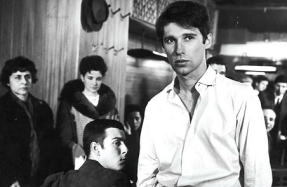
Reconsideration
When a filmmaker’s body of work starts doing the rounds of the cinematheques and museums, it provides an opportunity for re-evaluation or discovery. Even for those of us who are familiar with the cinema of Jean Eustache, the current retrospective, which screens this summer at TIFF Cinematheque and other North American venues, is a substantial reminder that there’s a lot we still don’t know about this singular director. I first encountered Eustache in 2000, when the full retrospective played the Pacific Film Archive in Berkeley. Due to a commercial rerelease of La maman et la putain (1973), I was able to see that film twice, and overall I came away with a general impression of Eustache that has, I think, been conventional wisdom for quite some time—that is, in his tragically abbreviated career, Eustache produced one towering masterpiece, a flawed but promising follow-up, and a collection of odds and ends of varying interest. I was also deeply moved by Eustache’s second fiction feature, Mes petites amoureuses (1974), in particular its partial deconstruction of the sentimental coming-of-age narrative, a kind of anti-Truffaut. But its formal approach struck me as something Eustache was still struggling to develop, whereas the self-indicting discursivity of La maman seemed perfectly executed.
In revisiting the films, I discovered, thankfully, that I am a very different viewer than I was 23 years ago, and I doubt that I am alone in this. Obviously, the film world of 2023 is quite different from that of 2000, or even 2008, when the films circulated again. In the press release for the Lincoln Center series “The Dirty Stories of Jean Eustache,” Les photos d’Alex (1980) is described as “a riff on Hollis Frampton’s Nostalgia [sic] that calls back to Eustache’s career-long experiments with representation and reality.” Looking back at the 2000 program notes on the PFA website confirmed my suspicion: there was no mention of Frampton and (nostalgia) (1971) in those notes, because even among the film literati Frampton wasn’t a consideration. He was part of that weird cadre of avant-gardists whose works could safely be ignored.
This is no longer the case. Like , is often considered its maker’s most significant, philosophically summative film. More significantly, Frampton and his experimental film cohort are now regarded less as outliers to the broader cinematic tradition than as one strand among) and at other times considered that movement’s last gasp, the gateway to the post-New Wave of Maurice Pialat, Luc Moullet, and Philippe Garrel. What if, as a thought experiment, we postulated something else—that Eustache was foremost a maker of experimental documentaries, a métier he arrived at after leaving narrative cinema behind?






